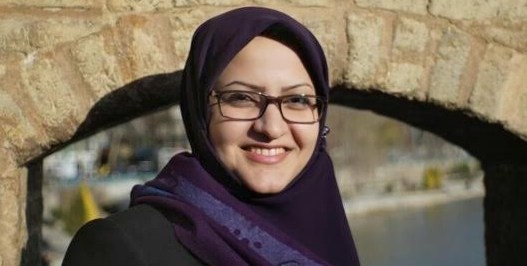PHOTO: Lawyer Minoo Khaleghi, barred by the Guardian Council from taking her seat in Parliament
LATEST
- Top Official: US, Saudi, & Turkish Generals Led Defeat of Iran’s Forces in Syria
- Guardian Council Objects Again to Government Budget
- Culture Minister: No Pilgrims to Mecca This Year
The disqualification of a young reformist MP elected in Iran’s February 26 Parliamentary vote is threatening a wider political battle in the Islamic Republic.
On Wednesday, the head of the Guardian Council, which vets all candidates for the Majlis, defended the ban on Minoo Khaleghi. Ayatollah Ahmad Jannati insisted that the Council’s powers of supervision continue after an election. He claimed a precedent for the disqualification, although he did not cite any other case.
The Government contends that only Parliament can review MPs after voting.
President Rouhani — who has challenged the powers of the Guardian Council, including its authority to ban candidates — said yesterday that he is “not hopeless” about Khaleghi’s case:
The Interior Ministry is currently carrying out necessary actions… We must not allow the law to be violated. If such a thing happens, hope in the future will be lost.
Khaleghi, a lawyer and activist, finished third among the MPs elected in the city of Isfahan. The Guardian Council has given no reason for her disqualification, although some reports have said it was based on photographs of her not wearing the hijab, the mandatory head covering for women.
The photographs were supposedly taken while Khaleghi was travelling in Europe and China. Police have arrested photojournalist Hamed Talebi for publication of the pictures.
Earlier this week, an agency of the judiciary, the Dispute Settlement Committee of Branches, said that the “new evidence” meant Khaleghi could not enter Parliament.
Khaleghi replied that the photographs were fakes and that she would sue those who distributed them. “I am a Muslim woman, adhering to the principles of Islam,” she wrote.
The centrist-reformist List of Hope won an unexpectedly large share of Parliamentary seats in both the February 26 first round and the April 29 run-off, despite the Guardian Council’s ban on thousands of candidates. The outcome has halted the conservative dominance of the Majlis since 2004, leaving no faction in control.
Top Official: US, Saudi, & Turkish Generals Led Defeat of Iran’s Forces in Syria
A leading official has blamed last week’s defeat of Iranian-led forces, supporting Syria’s Assad regime, on US, Saudi, and Turkish generals leading rebel factions.
Mohsen Rezaei, the Secretary of the Expediency Council, said the generals “specializing in special warfare” had led the takeover of Khan Tuman, near Aleppo, by rebels and the jihadists of Jabhat al-Nusra.
In their first admission of multiple casualties in Syria’s five-year conflict, the Revolutionary Guards have acknowledged the deaths of 13 troops and wounding of 21. A senior MP also said “five or six” soldiers were captured. A large but unknown number of Iranian-led foreign militia were also killed.
Rezaei, a former Revolutionary Guards commander, said that the rebels had received “weapons, ammunition, money and food from Turkey’s southern borders and its Iskenderun port” and that “Saudi Arabia and Qatar are providing aid to terrorists through the sea.
“Aleppo has now become a matter of prestige for Saudi Arabia and Turkey; hence, they are intervening there with full force. Aleppo, in fact, is the ultimate showdown between the resistance and invaders,” he claimed.
Guardian Council Objects Again to Government Budget
The Guardian Council has again objected to sections of the proposed Government budget for 2016/17, returning the bill to Parliament.
Council member Siamak Rahpeyk announced the rejection in a Wednesday meeting, the second time that the proposals had been handed back to the Majlis.
The Government was supposed to present the budget in December, but it was delayed by implementation of the nuclear deal and the February elections.
Iran, whose New Year began on March 20, has been operating with an emergency, short-term budget.
Culture Minister: No Pilgrims to Mecca This Year
Iran will not send pilgrims to Saudi Arabia this year for the annual hajj pilgrimage to Mecca.
Culture Minister Ali Jannati said negotiations over security had been held for months, but had failed to progress.
Iran said 464 of its pilgrims died in a crush on September 24 at Mina, near Mecca, during the “stoning of the devil” ceremony. The overall death is estimated to be at least 2,426.
In the aftermath of the incident, Iranian officials blamed the Saudi regime for the disaster, either from negligence or willful manipulation.
Saudi Arabia broke relations with Tehran in January after its embassy was attacked by a crowd in Tehran. The demonstration was sparked by Riyadh’s execution of a prominent Shia cleric, Sheikh Nimr al-Nimr.
Jannati said on Thursday, “They did not accept our proposals concerning the issuing visas or security and transport of the Iranian pilgrims.”
On Wednesday, Foreign Minister spokesman Hossein Jaberi Ansari blamed Saudi Arabia for the failed talks.
“If no agreement is reached on these issues, Saudi Arabia will be responsible for shutting the way to sending Iranian pilgrims,” Ansari said.

